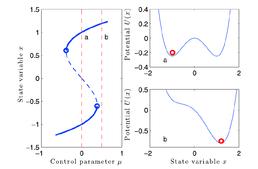Early warning signals in climate data
- Started
- 28th November 2010
- Ended
- 30th April 2011
- Research Team
- Maike Sonnewald
- Investigators
- Kevin Oliver, James Dyke

Figures from Ditlevsen and Johnsen (2010). Left figure showing a simple bifurcation diagram of a state variable as a function of a controll parameter, with two bifurcation points (blue curcles). Stable states denoted by solid lines, while stippled lines
Paleoclimatic records reveal that the Earth’s climate system has undergone sharp transitions between
states. Much work has recently been devoted to assessing how likely the current climate is to undergo such a sharp transition. This is motivated by the severe socioeconomic consequences such dramatic changes would entail. Thus, predicting iminent transitions would be very valuable. This review provides an overview of two promising techniques which could potentially be used to assess the stability of components of the climate system. These techniques are degenerate fingerprinting and detrended fluctuation analysis (DFA). It is found that degenerate fingerprinting is more widely used, but that DFA could be more suitable. DFA allows for memory in the time-series, and can give better results with less data. However, the DFA technique is best suited for systems close to the transitions, and relies on calibration with the degenerate fingerprinting technique further from the transition. Applying these techniques to forecast transitions is unfortunately impeded by lack of suitable data. Using data from several sources could overcome this. Thus, the techniques could be very valuable if the use of unevenly spaced data from several sources does
not lead to serious loss off accuracy. However, the techniques are still very useful when assessing underlying dynamics in model output and paleooceanographic time-series.
Categories
Physical Systems and Engineering simulation: Climate, Earth Observation, Earth surface dynamics, Oceanography
Algorithms and computational methods: statistical analysis
Transdisciplinary tags: Complex Systems